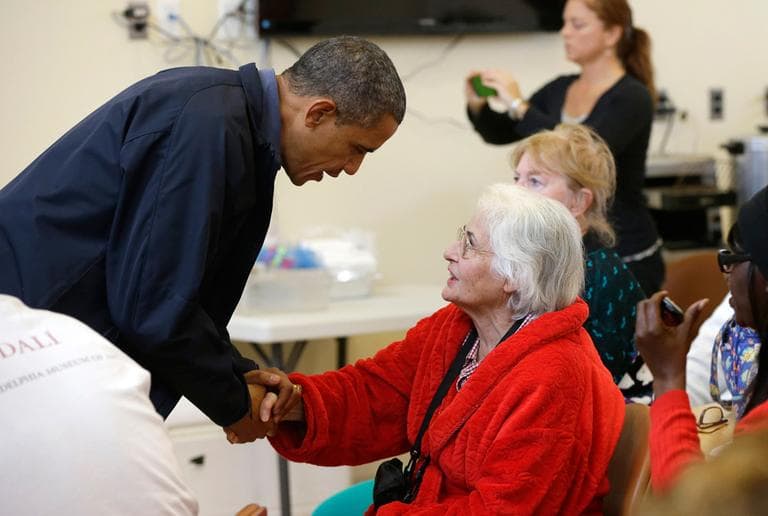Advertisement
Do Disasters Help Incumbents? Survey Says: Yes

President Obama may benefit politically from Hurricane Sandy, provided his relief efforts are viewed as timely and well-managed. Research by political scientists, published in 2009, shows that voters reward presidents for delivering relief spending after a disaster strikes:
Examining data from 1988-2004, Neil Malhotra of Stanford Graduate School of Business and economist Andrew Healy of Loyola Marymount University found that a doubling of relief payments before an election on average boosts the incumbent's vote share by about 0.5 percentage points, potentially enough to swing a very close election. The images of President Barack Obama visiting the Federal Emergency Management Agency (FEMA) and pledging federal disaster aid to affected communities therefore may help him at the ballot box next week.
Punished for bungling. If you hold an executive job and you botch things in a major storm-related disaster, you could find yourself out of that job. Consider the case of Chicago Mayor Michael Bilandic, who lost his job in 1979 for failing to plow the streets after a major snowstorm dropped 20 inches of snow on the city over a January weekend. Slow response to clearing city streets cost Bilandic his job; he actually lost his primary, which means his own party wanted him gone. Other factors were at work, including a scandal involving a former well-connected deputy mayor who got a $90,000 contract to devise an emergency snow removal plan called “late and amateurish.”
Blamed for Mother Nature, blessed for success, dumped for failure. Two political scientists, who looked at gubernatorial and presidential elections from 1970 to 2006, found that extreme weather affects how voters feel about a political executive and that botching disaster response can ruin an incumbent’s chances for reelection. Even if voters are woefully unhappy about an act of nature, and may even blame it on incumbent political leaders, voters respond well to prompt, effective responses in cleanup and rebuilding. “Voters punish leaders for failing to react adequately to natural disasters – and reward those who respond effectively,” they discovered (PDF).
Christie seizes an opportunity. N.J. Gov. Chris Christie has heaped praise upon Obama for his swift response to storm damage in his state. A Republican, he described the president as “outstanding” and “incredibly supportive.” He did this for three reasons:
- He wanted his state to be at or near the top of the list of states to receive dollars and workers.
- He wanted to show that he is putting his state’s interest ahead of the presidential politics — a safe move considering president Obama’s has a sizable lead in N.J.
- He wanted to establish his independence from Mitt Romney, who has very, very little he can do in the aftermath of Sandy. Christie is a favorite GOP presidential hopeful in 2016 if Romney loses on Tuesday.
Romney’s “immoral” federal help. At a Republican primary debate last year, The New York Times reported:
Mr. Romney was asked whether emergency management was a function that should be returned to the states. He not only agreed, he went further.
“Absolutely,” he said. “Every time you have an occasion to take something from the federal government and send it back to the states, that’s the right direction. And if you can go even further and send it back to the private sector, that’s even better." Mr. Romney not only believes that states acting independently can handle the response to a vast East Coast storm better than Washington, but that profit-making companies can do an even better job. He said it was “immoral” for the federal government to do all these things if it means increasing the debt.
Do the right thing. Obama can benefit simply by doing the right thing: managing federal relief efforts and avoiding trips to battleground states not affected by storm damage.
About four years ago, the nation stood on the brink of financial collapse. GOP Sen. John McCain reacted badly, threatened to cancel a debate, rushed to Washington, and had nothing to say once he got there, and declared that the “fundamentals of our economy are strong,” later saying the fundamentals are “at great risk.”
Obama remained cool and measured and looked presidential. It was as if he was the right man for the job. Four years later, it looks like déjà vu.
Dan Payne is WBUR’s Democratic analyst. For more political commentary, go to our Payne & Domke page.
This program aired on October 31, 2012. The audio for this program is not available.
